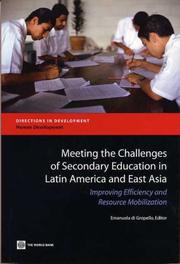| Listing 1 - 10 of 16 | << page >> |
Sort by
|
Book
ISBN: 1283446634 9786613446633 0821389114 0821384902 Year: 2012 Publisher: Washington, D.C. : London : World Bank ; Eurospan [distributor],
Abstract | Keywords | Export | Availability | Bookmark
 Loading...
Loading...Choose an application
- Reference Manager
- EndNote
- RefWorks (Direct export to RefWorks)
This book assesses whether East Asian higher education is providing research and innovation for growth and delivering its graduates with the skills necessary for productivity in the labor market. It also seeks to determine how higher education systems could be improved in order to deliver these outcomes. It features new data and diagnostic material to better understand labor markets, what skills firms want, and what skills graduates have; shows how countries can become more innovative; and describes in detail the key areas of reform needed for higher education to be a larger engine of East Asi
Education, Higher --- College students --- Higher education --- Education --- Postsecondary education --- Universities and colleges
Book
Year: 1992 Publisher: Oxford
Abstract | Keywords | Export | Availability | Bookmark
 Loading...
Loading...Choose an application
- Reference Manager
- EndNote
- RefWorks (Direct export to RefWorks)
Digital
ISBN: 0821355163 Year: 2003 Publisher: Washington, D.C. World Bank
Abstract | Keywords | Export | Availability | Bookmark
 Loading...
Loading...Choose an application
- Reference Manager
- EndNote
- RefWorks (Direct export to RefWorks)
Digital
Year: 2004 Publisher: Washington, D.C. World Bank
Abstract | Keywords | Export | Availability | Bookmark
 Loading...
Loading...Choose an application
- Reference Manager
- EndNote
- RefWorks (Direct export to RefWorks)

ISBN: 0821365258 9780821365250 Year: 2006 Publisher: Washington, D.C. World Bank
Abstract | Keywords | Export | Availability | Bookmark
 Loading...
Loading...Choose an application
- Reference Manager
- EndNote
- RefWorks (Direct export to RefWorks)

ISBN: 0821366459 0821366467 9780821366455 Year: 2006 Publisher: Washington, D.C. World Bank
Abstract | Keywords | Export | Availability | Bookmark
 Loading...
Loading...Choose an application
- Reference Manager
- EndNote
- RefWorks (Direct export to RefWorks)
Objectives of teaching --- Secondary education --- East Asia --- Latin America
Book
ISBN: 1280086483 9786610086481 0585467536 Year: 2003 Publisher: Washington, DC : World Bank,
Abstract | Keywords | Export | Availability | Bookmark
 Loading...
Loading...Choose an application
- Reference Manager
- EndNote
- RefWorks (Direct export to RefWorks)
Education --- Evaluation.

ISBN: 0821365258 9780821365250 9786610305308 1280305304 0821365266 Year: 2006 Publisher: Washington, DC : World Bank,
Abstract | Keywords | Export | Availability | Bookmark
 Loading...
Loading...Choose an application
- Reference Manager
- EndNote
- RefWorks (Direct export to RefWorks)
This paper provides a comparative analysis of school-based management reforms in four Central American countries (EDUCO in El Salvador, PRONADE in Guatemala, PROHECO in Honduras, and Centros Autonomos in Nicaragua). It starts by providing a characterization of the models and then reviews how they have expanded community participation and empowerment and school decisionmaking autonomy. It then continues by analyzing the impact of community and school empowerment on the teaching-learning process, including measures of teacher effort. The paper assesses the impact of the models on several educati
School management --- Central America --- Education --- Schools --- Decentralization --- Public institutions --- Public schools

ISBN: 0821366459 0821366467 9780821366455 9786610542598 1280542594 Year: 2006 Publisher: Washington, D.C. : World Bank,
Abstract | Keywords | Export | Availability | Bookmark
 Loading...
Loading...Choose an application
- Reference Manager
- EndNote
- RefWorks (Direct export to RefWorks)
In a context of increased primary school enrollment rates, secondary education is appearing as the next big challenge for Latin American and East Asian countries. This report seeks to undertake a detailed diagnostic of secondary education in these two regions, understand some of the main constraints to the expansion and improvement of secondary education, and suggest policy options to address these constraints, with focus on policies that improve the mobilization and use of resources.
Objectives of teaching --- Secondary education --- East Asia --- Latin America --- Education, Secondary --- Educational change --- Change, Educational --- Education change --- Education reform --- Educational reform --- Reform, Education --- School reform --- Educational planning --- Educational innovations --- Children --- High school education --- High school students --- Secondary schools --- Teenagers --- Education --- High schools --- Education (Secondary)
Book
Year: 2010 Publisher: Washington, D.C., The World Bank,
Abstract | Keywords | Export | Availability | Bookmark
 Loading...
Loading...Choose an application
- Reference Manager
- EndNote
- RefWorks (Direct export to RefWorks)
This paper focuses on the estimation of skill/industry premiums and labor force composition at the national and sector levels in seven East Asian countries with the objective of providing a comprehensive analysis of trends in demand for skills in the region. The paper addresses the following questions: Are there converging or diverging trends in the region regarding the evolution of skill premiums and labor force composition? Are changes in skill premiums generalized or industry-related? How have industry premiums evolved? The analysis uses labor and household surveys going back at least 10 years. The main trends emerging from the analysis are: (a) increasing proportions of skilled/educated workers over the long run across the region; (b) generally increasing demand for skills in the region; (c) the service sector has become the most important driver of demand for skills for all countries (except Thailand); (d) countries can be broadly categorized into three groups in relation to trends and patterns of demand for skills (Indonesia, Philippines, and Thailand; Vietnam and China; and Cambodia and Mongolia); and (e) industry premiums have increased in three countries of the region (Philippines, Thailand, and Cambodia). These trends point to several policy implications, including that governments should focus on policies promoting access to education to address the increasing demand for skills and/or persistent skill shortages; support general rather than specific curricula given broad-based increases in skill premiums in most countries; better tailor curriculum design and content and pedagogical approaches to the needs of the service sector; and target some social protection programs to unskilled workers to protect them from the "unequalizing" impact of education.
Drivers --- Education --- Education For All --- Household surveys --- Income inequalities --- Jobs --- Labor demand --- Labor force --- Labor market --- Labor market segmentation --- Labor Markets --- Labor reallocation --- Productivity growth --- Secondary Education --- Service sector --- Skill premiums --- Skill shortages --- Skill upgrading --- Skill-biased technologies --- Skilled labor --- Social Protections and Labor --- Tertiary Education --- Unskilled workers --- Wage premiums --- Water and Industry --- Water Resources --- Workers
| Listing 1 - 10 of 16 | << page >> |
Sort by
|

 Search
Search Feedback
Feedback About UniCat
About UniCat  Help
Help News
News